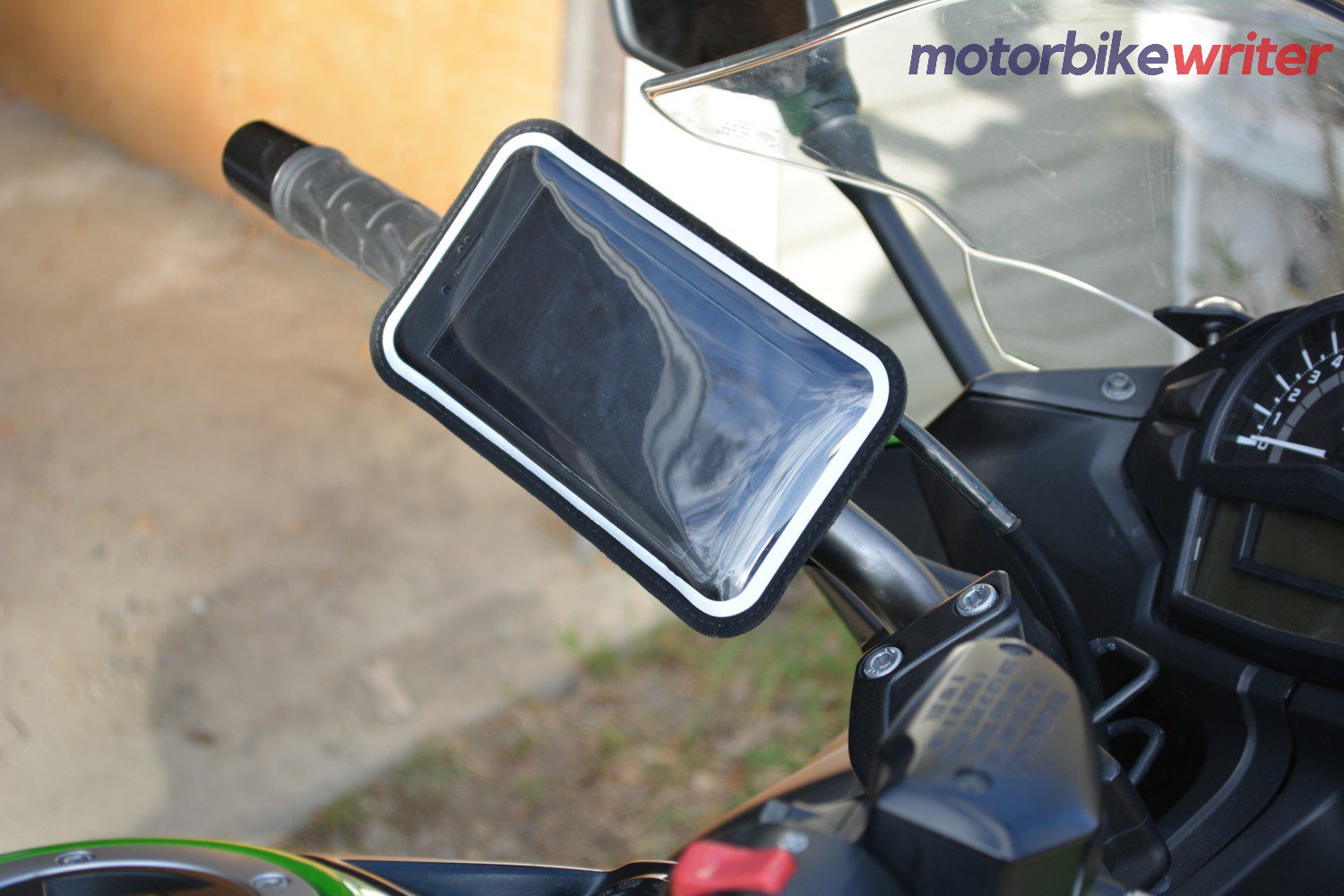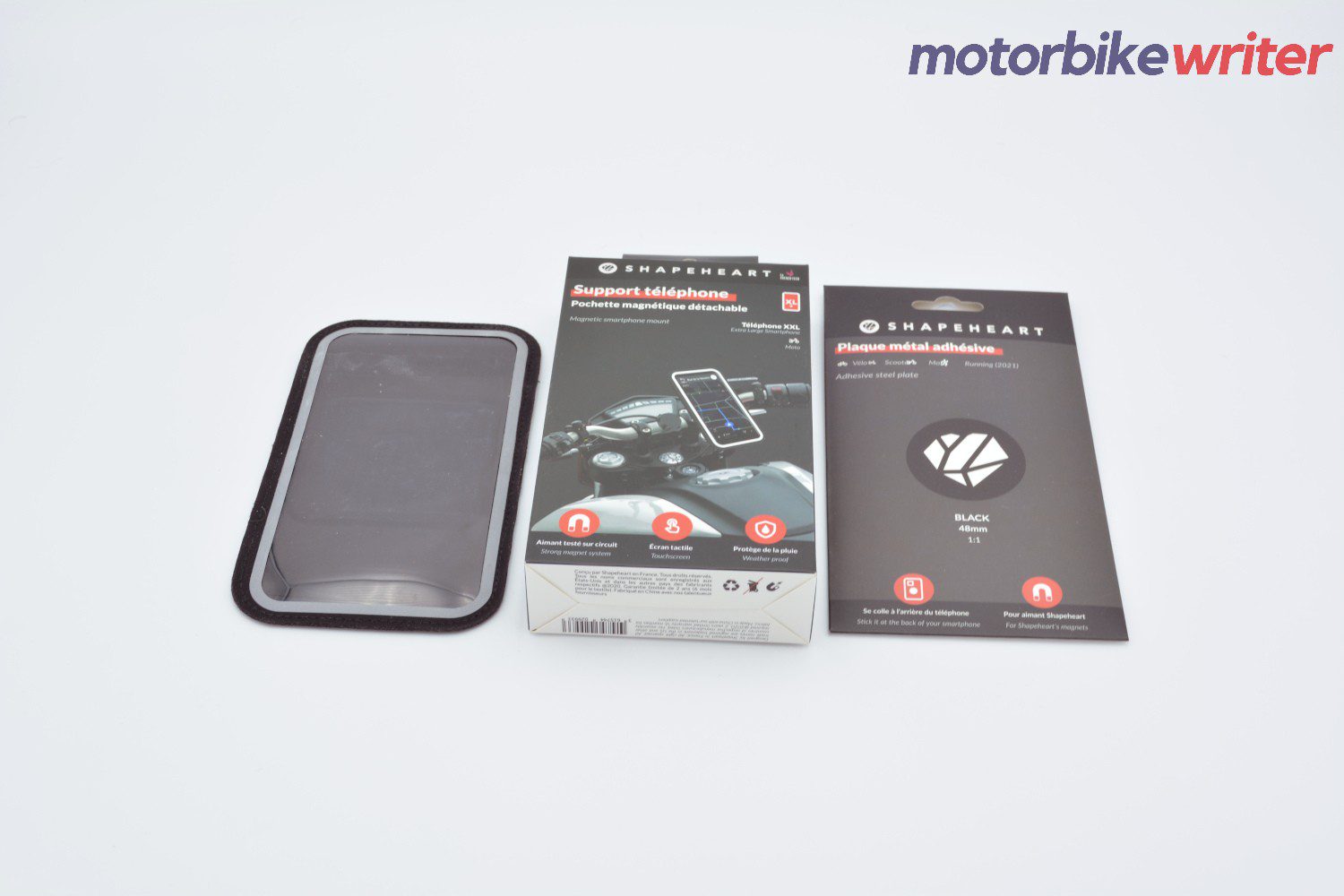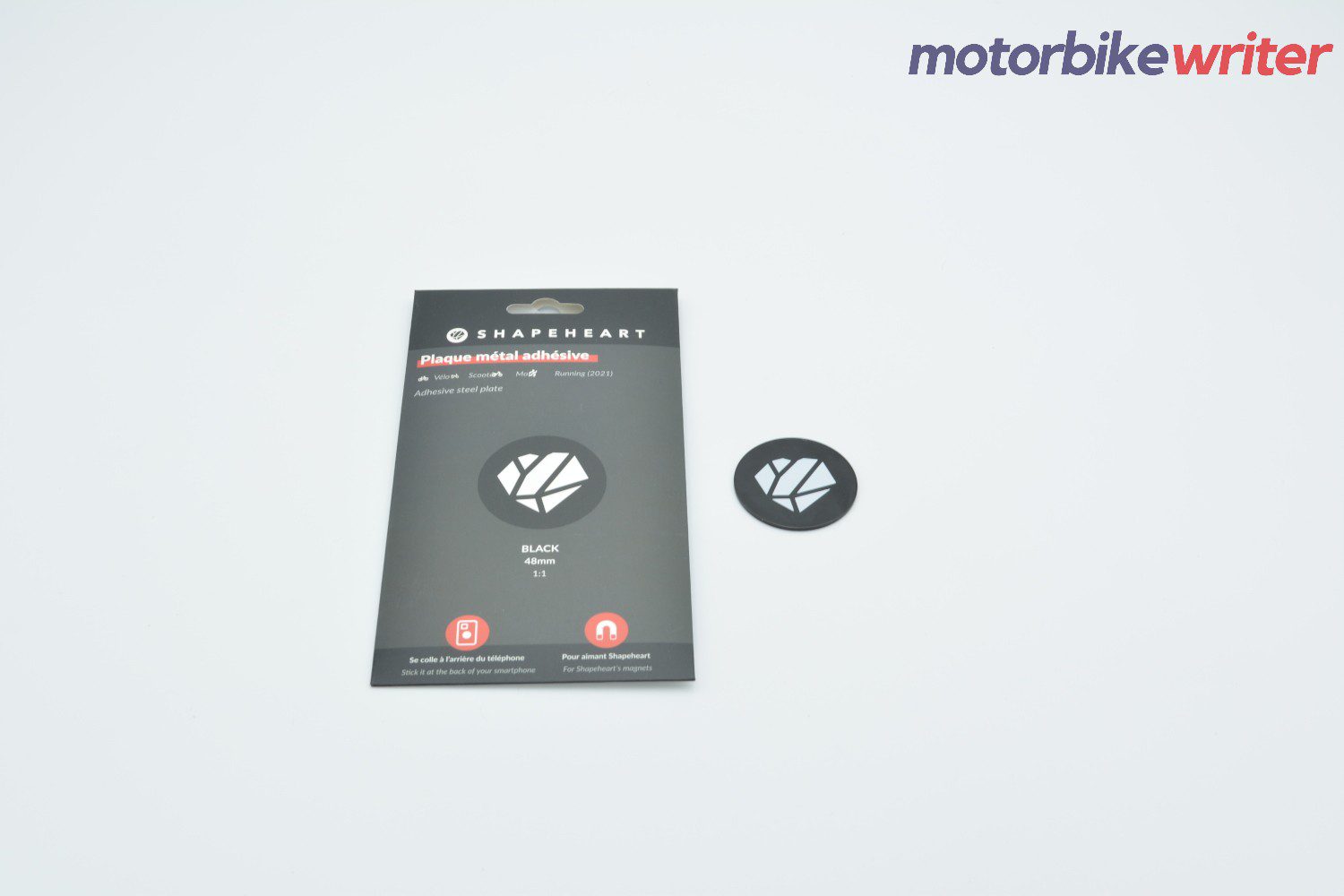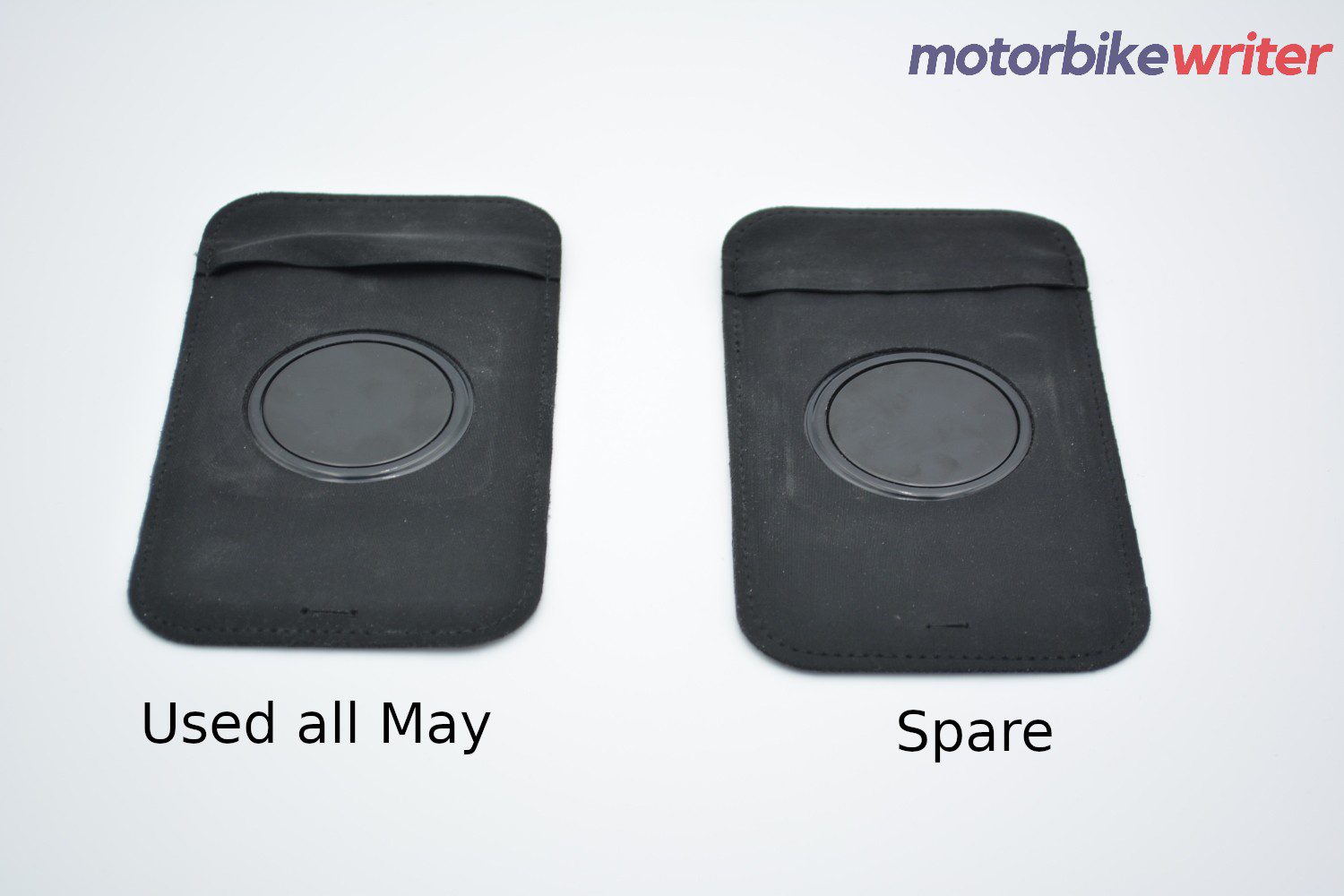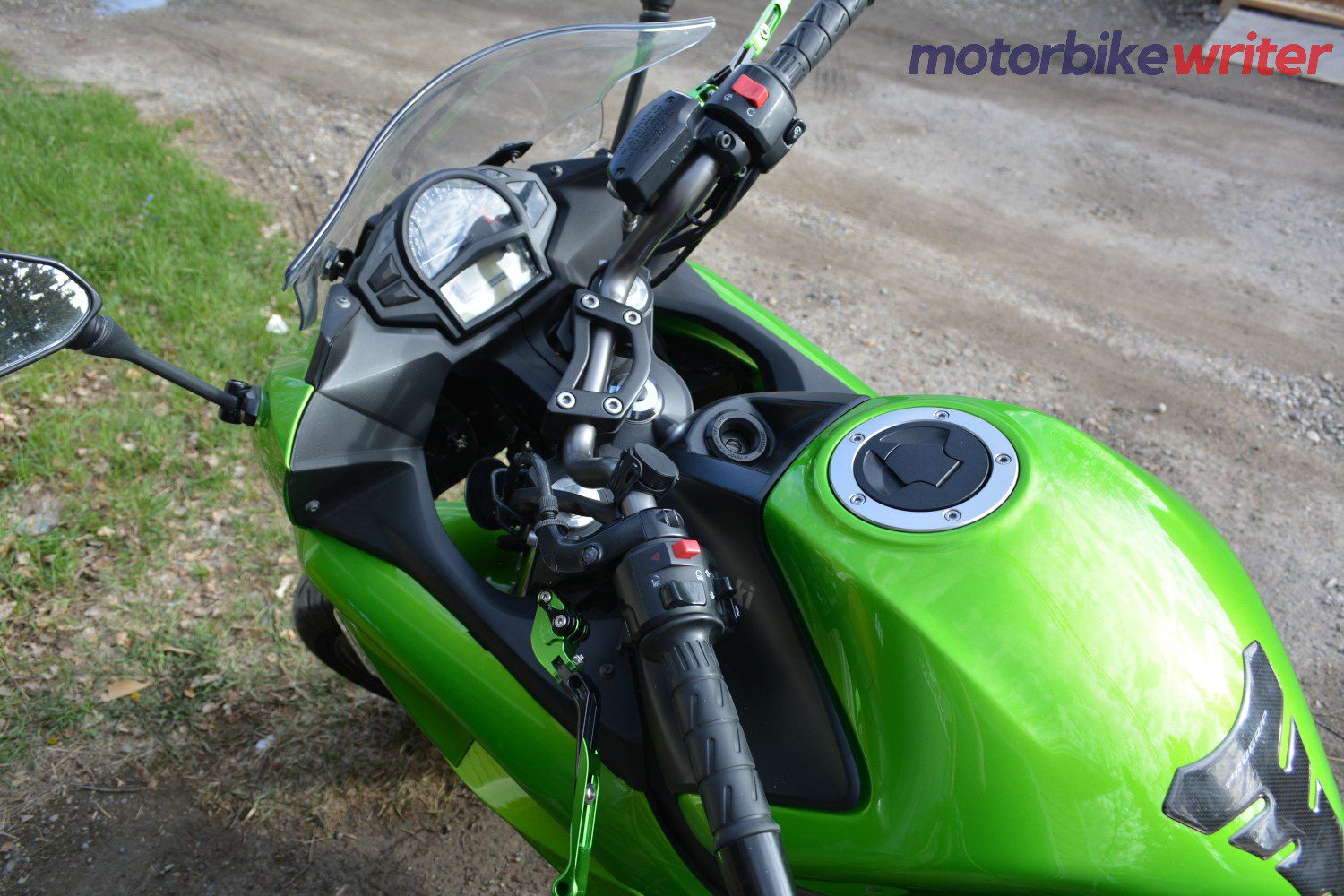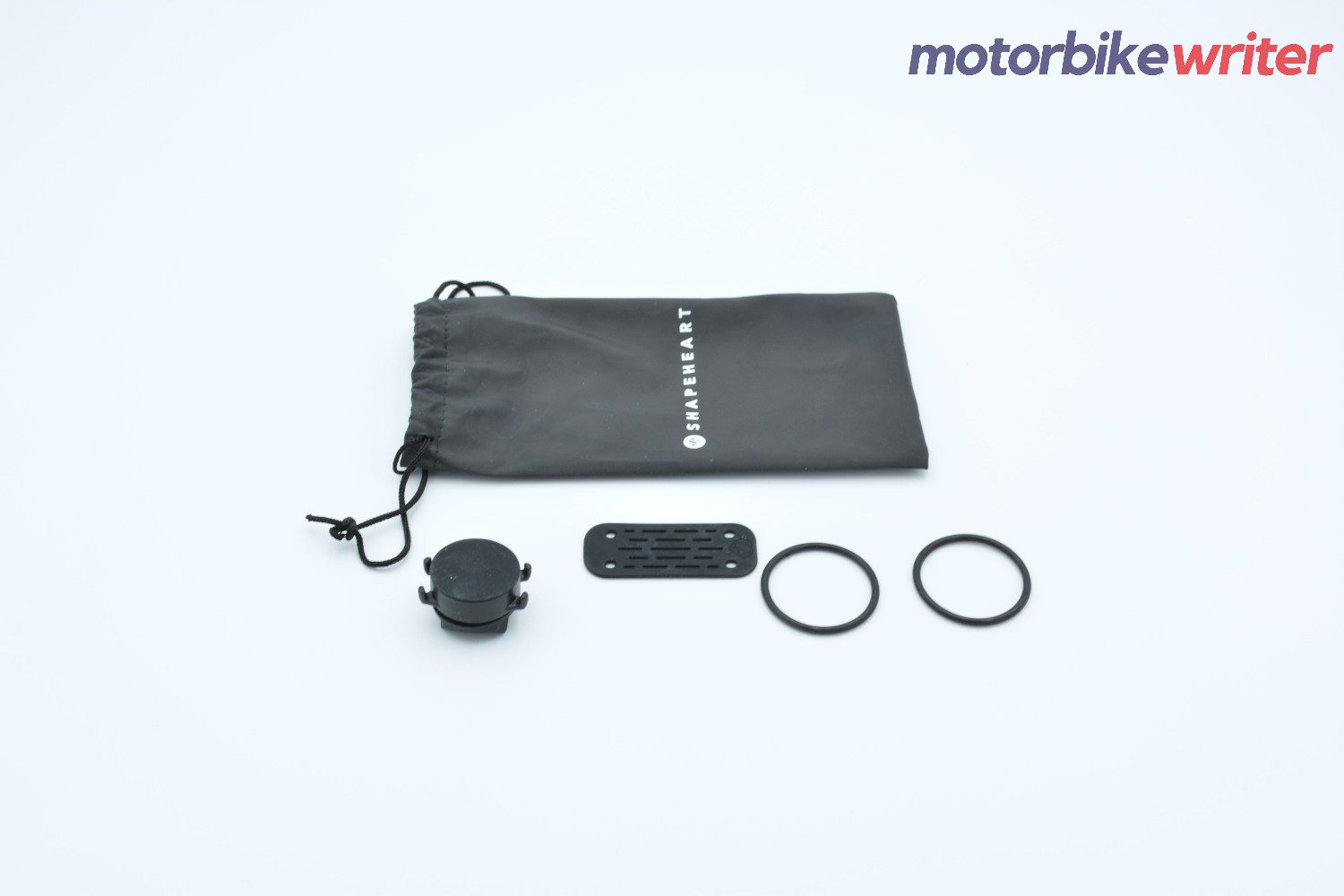In the motorcycling world, much like with the car world, using your smartphone while riding/driving is just asking for an accident to happen. However, smartphones have become useful tools for motorcyclists to view important information. Speedometer doesn’t work? Download a GPS speedometer app. Want to check if your action camera is recording? View its status on your phone.
One of the most important uses for riders with their smartphones is GPS navigation. In fact, most phones, from either the iOS or Android base operations systems, will come with a baked-in GPS navigation map app. As well, there are multiple third-party apps, of which the most popular is by far Waze.
Being able to see these maps and upcoming turns is helpful, especially if you do not have a Bluetooth comm system in your helmet for the phone to broadcast directions to you. This is where the handlebar phone mounting system comes in, with multiple competitors from around the world vying to create the best solution.
About Shapeheart
Shapeheart is a relative newcomer to the mountable smartphone world, started by two friends, Antoine and Michael. Based in France, the company started almost by accident, as the two friends were working on creating an armband that could track heart rate that wrapped around the bicep, preventing the shaking that watches could encounter, or the discomfort of a heart-rate belt strapped around the chest.
They were encountering problems with fitting an optical sensor inside the armband, but the phone that it would connect to was too far away, or too had many layers between the phone and the sensor, which could use NFC to communicate. So, they developed a magnetic mount system that took a full 14 iterations to get just right, that didn’t add any weight to the arm but also wouldn’t have the phone jostled loose during jogging, walking, or exercising.
In 2019, they developed this concept further and released the bike handlebar phone holder, designed for use on the multitudes of bicycles that are popular across France, and Europe as a whole. From this design, it was realized that the system could be adapted to work with motorcycles, and in 2020, their first motorcycle phone mount system was released.
About Motorbike Writer’s Review Policy
This product was provided at no charge for the purpose of this review. Note that we do not allow brands to influence review scores or content. Please see our review policies for more information.
We here at Motorbike Writer believe that you can’t just try something out once and give an honest opinion of it. Any product we test is actually used by our testers, and for the month of May, 2021, I took off the other phone mount that I have for my bike and used the Shapeheart kit, rain or shine, good and/or bad.
The Shapeheart Classic Handlebar Phone Mounting System
Bike: 2012 Kawasaki Ninja 650
Phone: Apple iPhone 8 Plus
Let me start off by thanking Shapeheart for providing us a review sample of their handlebar mounting system. Before we get started, I should mention that before and after the Shapeheart review period, I personally use a QuadLock handlebar mount, with the optional vibration damper accessory attached. For the purposes of this review, to not taint any perspectives or bring subjectivity into it, I packed the QuadLock back up into its box and put it on the top shelf of my wardrobe, so that I would not be tempted to reinstall it.
Included in the package were the Classic Handlebar Mount boxed product itself, a spare phone sleeve, and a steel one-sided magnetic plate that attaches to a phone or phone case with strong 3M adhesive.
Shapeheart’s packaging, as you can see in the image above, is exactly the kind of thing that would look right at home on a retail peg in the local gear store. It’s unobtrusive, professionally designed, and does a good job listing what you’re getting in the packaging.
Unboxing
Opening the main mounting system box, you will find a drawstring bag that holds the magnet, the silicone mounting strap, and a pair of strong mount retention elastic bands. Honestly, the biggest surprise here was the bag, which turned out to be very useful. Personally, I put my registration and insurance card into the bag and placed them in the tail section of my bike. You could use it for other things as well, such as a place to keep spare GoPro batteries if you’re a vlogger out on a long ride.
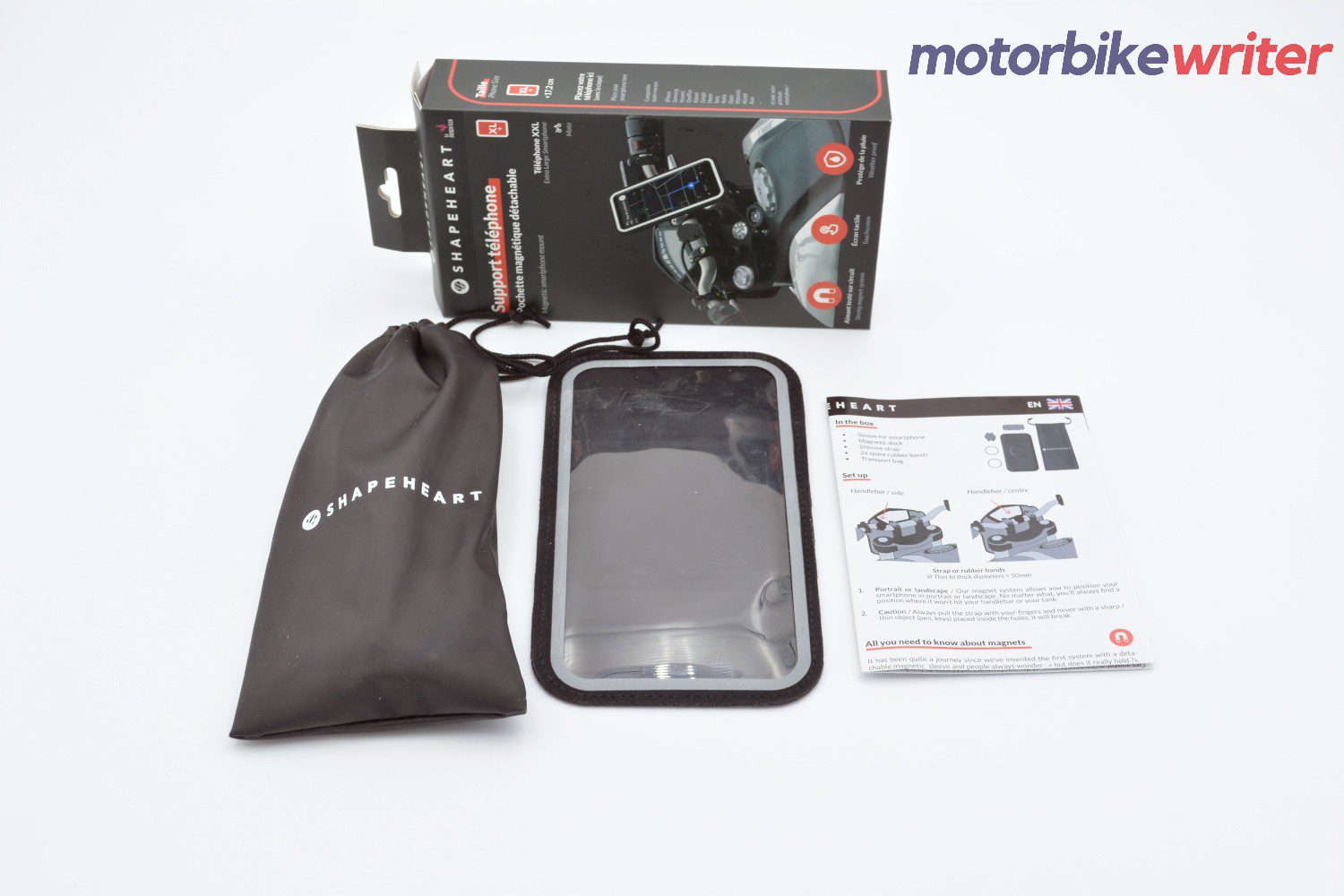
Phone Sleeve
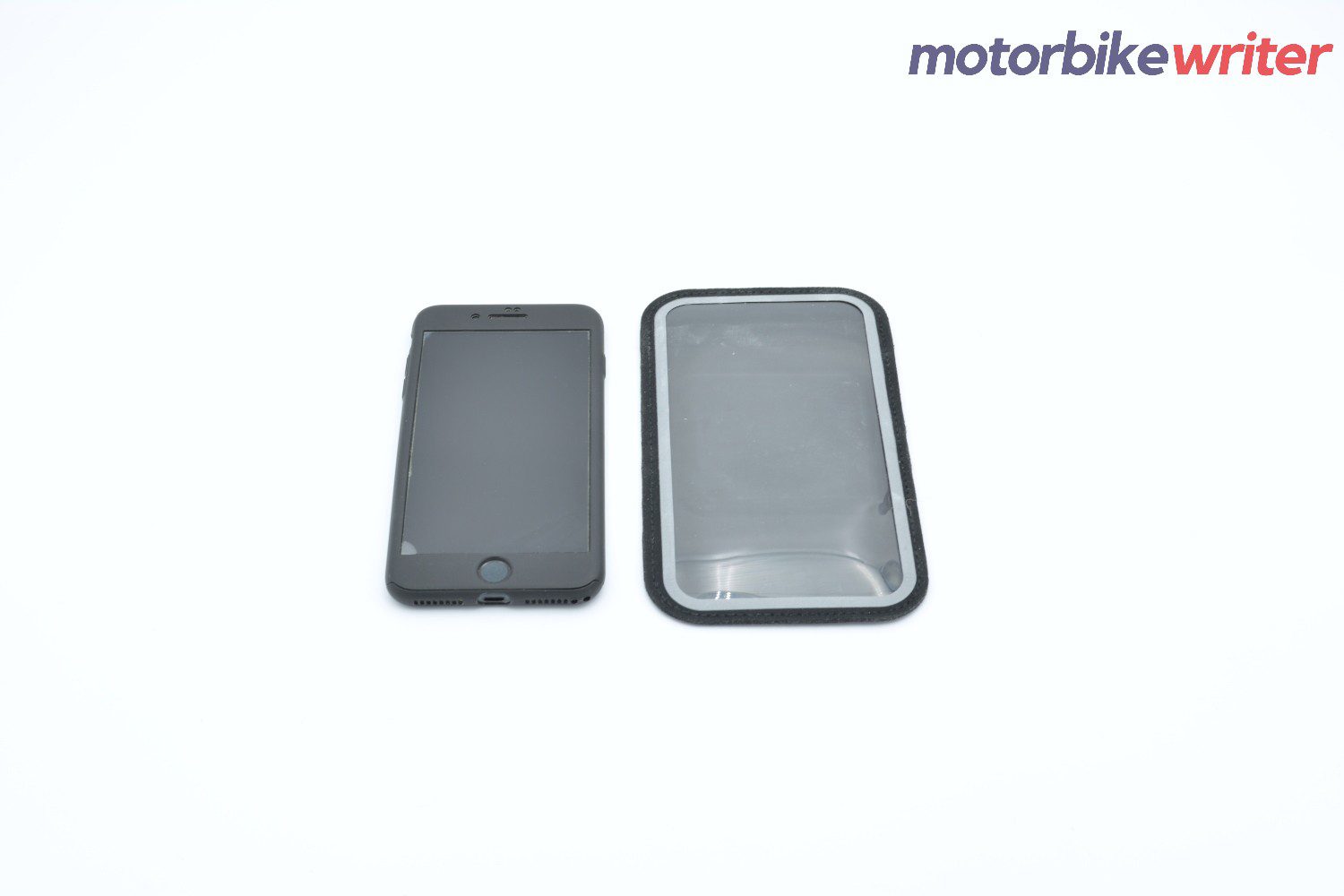
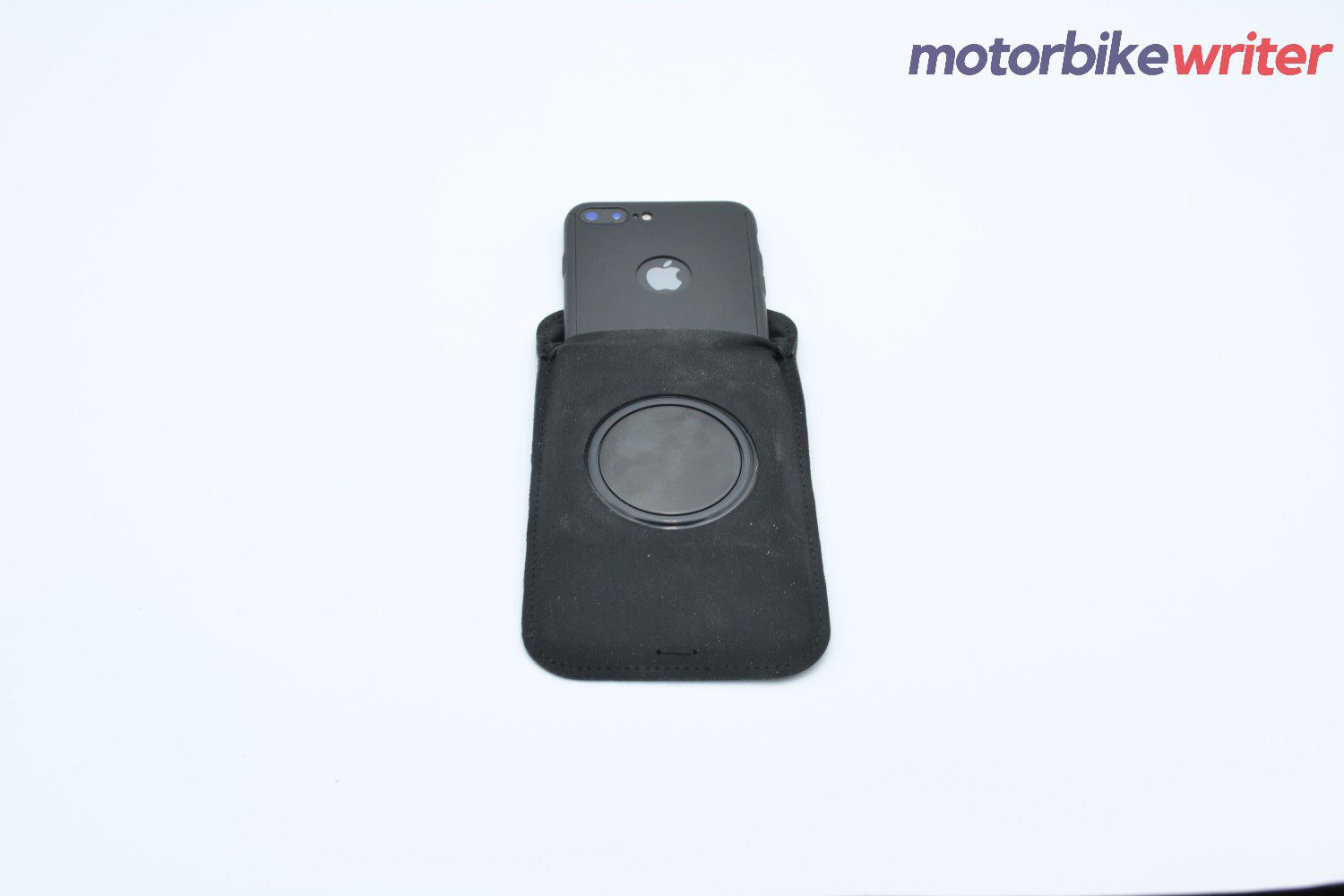
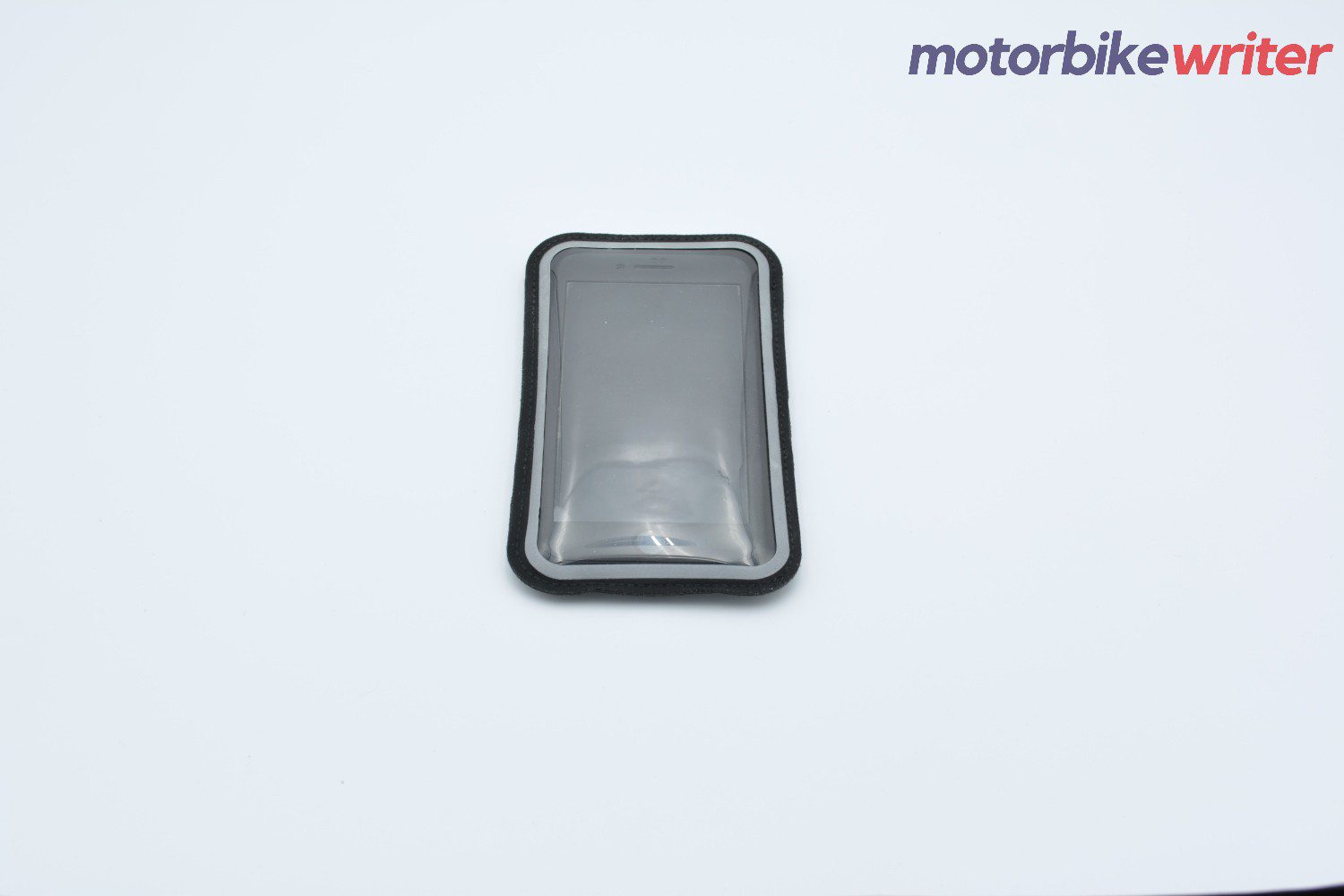
Phone Mount Installation
As I ride a 2012 Kawasaki Ninja 650, my handlebar tube is only 7/8ths of an inch, so the extra mounting rubber bands were not needed. The magnet has four little upraised fingers, two per side, that mate to the four holes, two per end, of the main elastic silicone stretch strap. The mount relies on material tension to maintain stability, which is another reason that the main strap is silicone – to provide a strong grip even on the slipperiest of painted bars.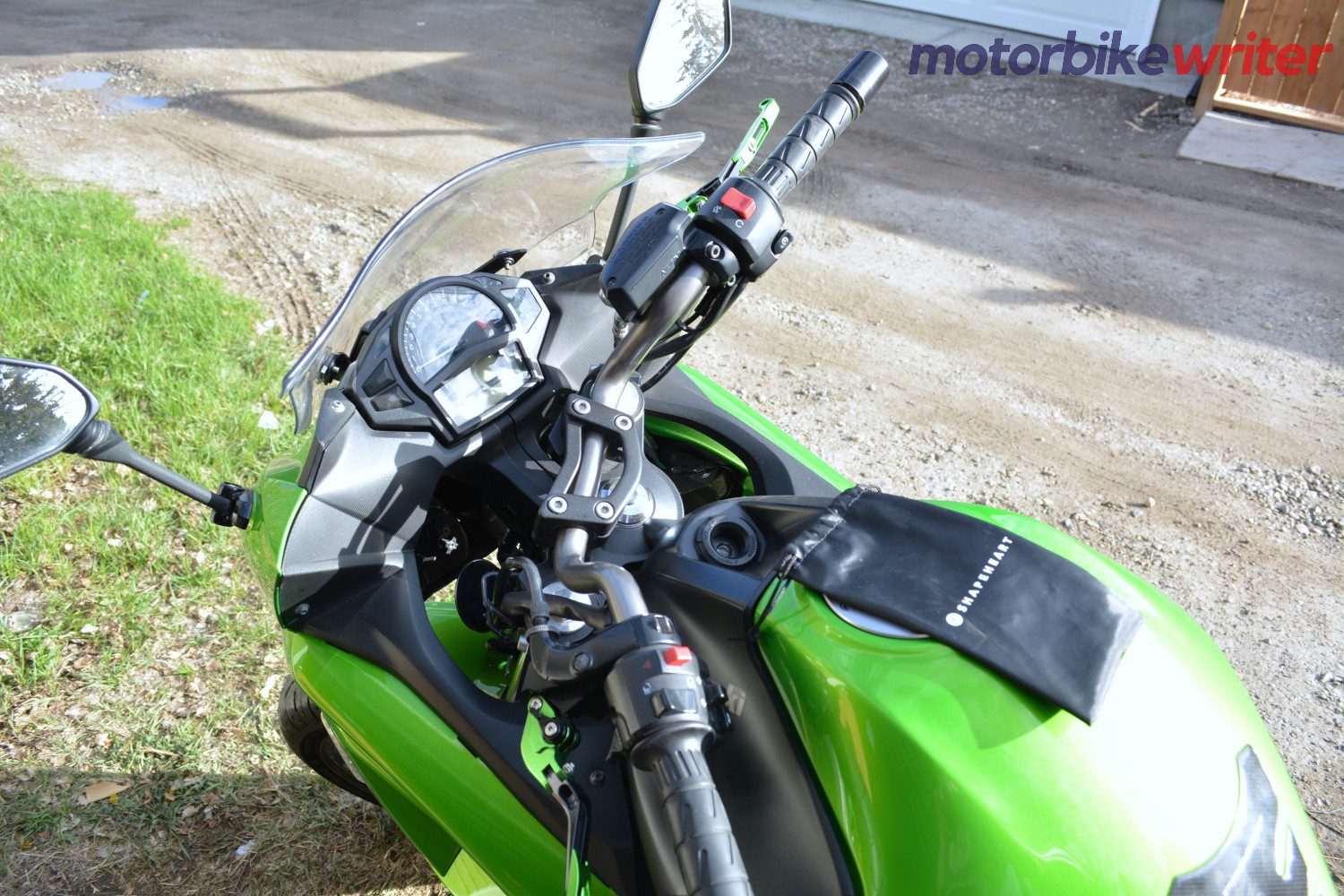
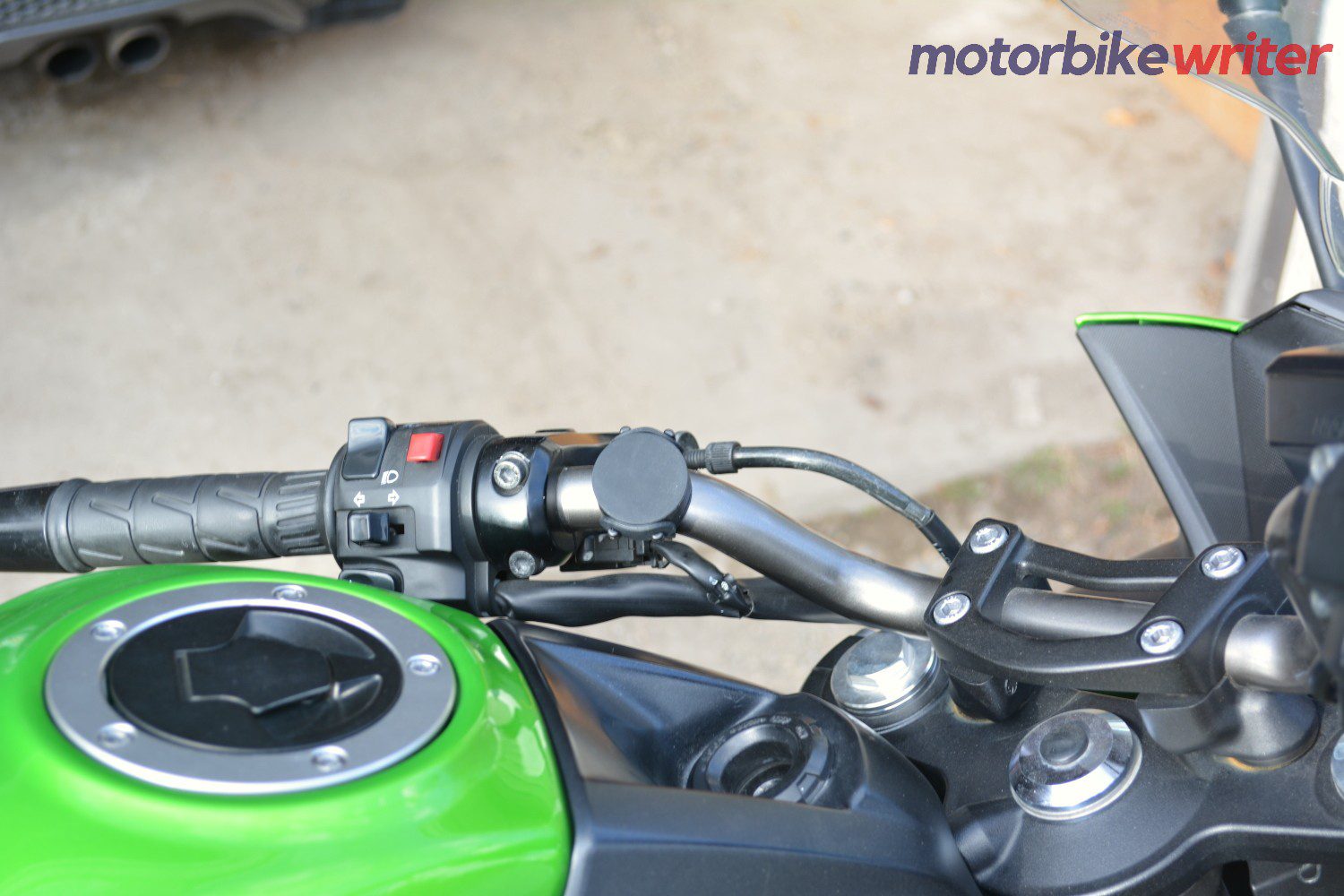
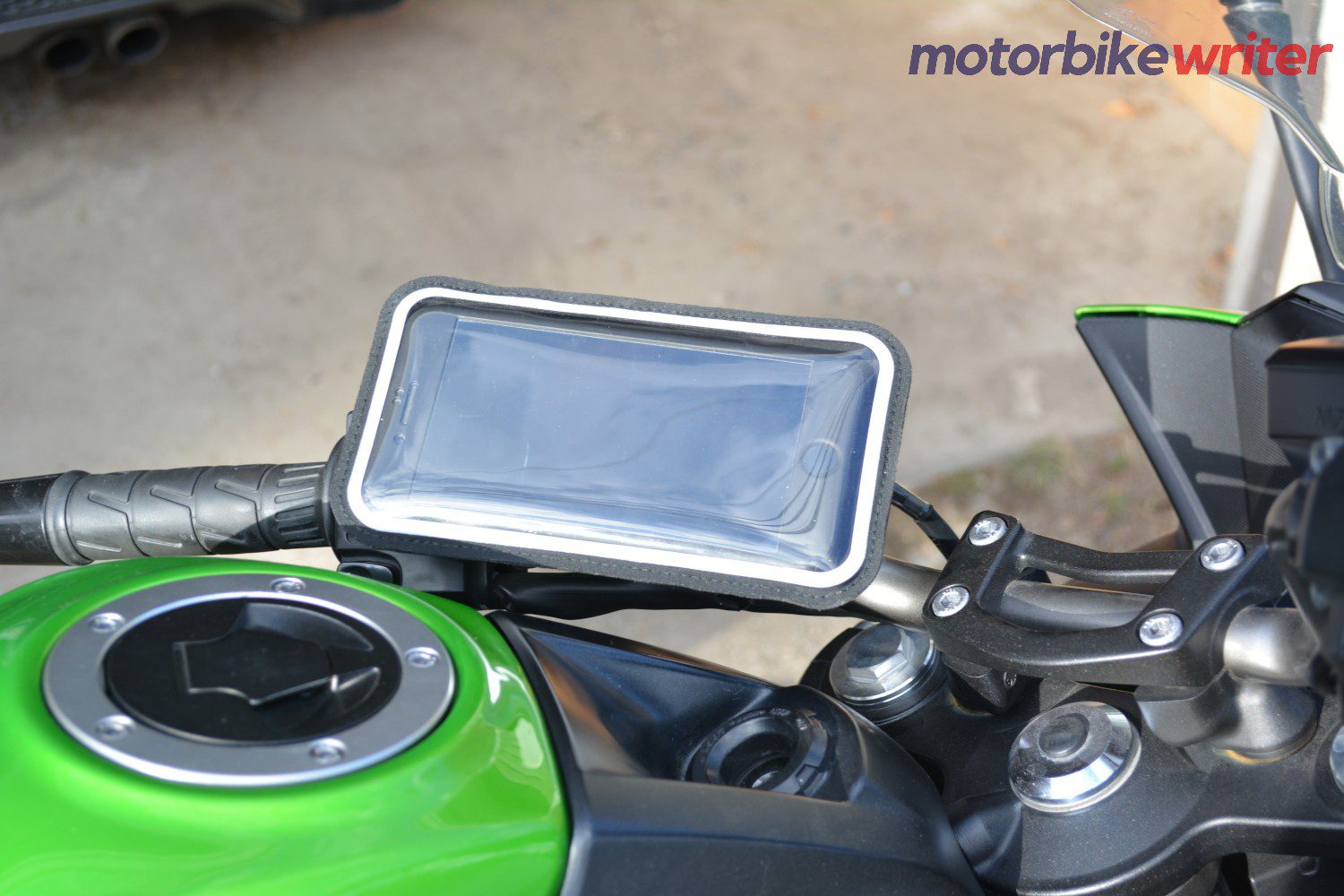
Shapeheart Strengths
Good Waterproofing
My concern over the phone sleeve, upon first seeing it, was that the fold-over style of closure was going to be a point of failure. Yet, with the correctly sized sleeve, my iPhone never even thought about slipping out of the sleeve. My other concern was that, with the sleeve ostensibly being waterproof, that having that flap would allow moisture and water in.
However, in both artificial testing (holding my phone in its sleeve under a spray faucet attachment) and real-world experience (getting caught in light rain for 15 minutes while out on my bike), the sleeve did remarkably well. Road mist coming up from the tires of vehicles around me peppered the back of the sleeve, without making it in to affect the phone.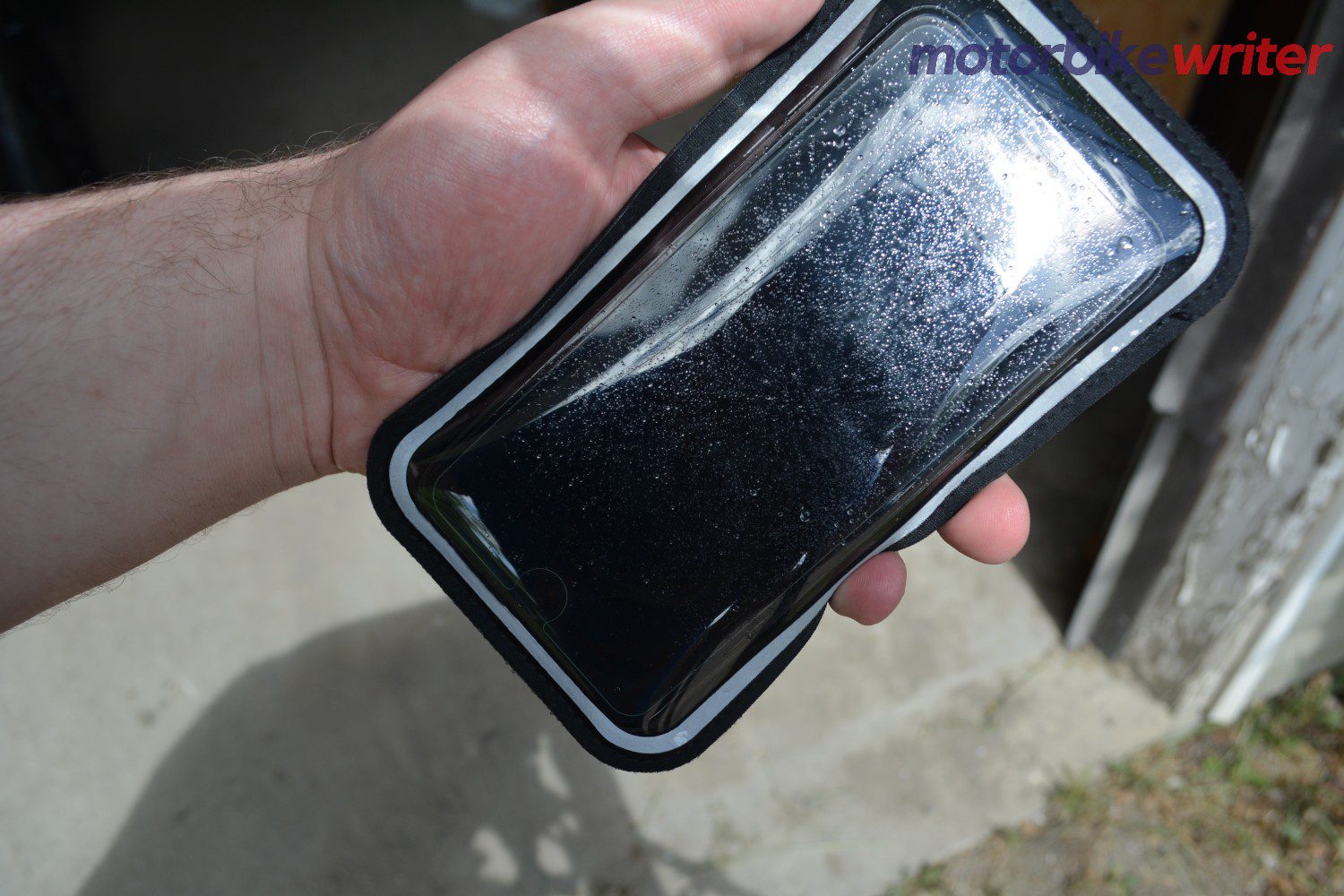
Extremely Durable Materials Used
I also was a bit clumsy with my phone. I had one heart-stopping moment when I pulled the sleeve with my phone inside off the magnet mount and it slipped from my hand, landing face down in a parking lot. The end result? A minor scuff, barely noticeable, on the clear plastic of the sleeve. No damage to my screen or phone.
As I had two sleeves, I also carried the second one around with me at all times. For this part of the testing, I was not gentle with it, as many people are not gentle with their phones. If they were, Otterbox, Ballistic, and other phone case companies wouldn’t have a market!
As such, the spare sleeve was shoved in a back pocket, crammed into one of the chest pockets of my Alpinestars Andes V3 jacket, put in the same pocket as my house keys, earplugs case, and wallet in my Rev’It Arc Air jacket, dropped on the ground, tossed on a shelf with tools on it, and so on.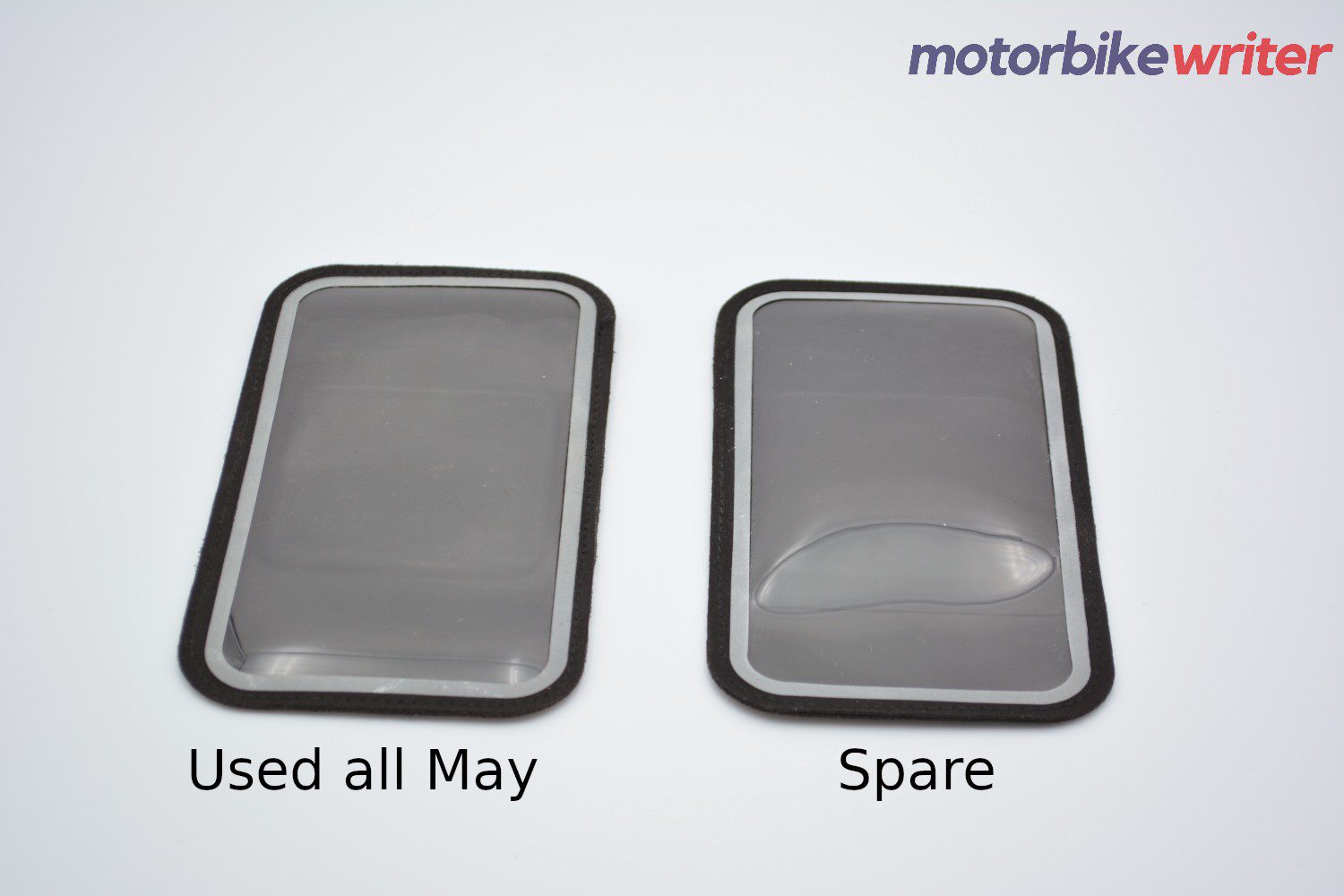
Very Strong Magnetic Mounting
Common bike mounts these days are either pressure-fit systems that grab the corners and/or edges of your phone or use a case with a twist-lock mechanism. Using a pure magnetic connection is a bit of fresh thinking in the motorcycle phone mounting space, and I can tell you with 100% confidence that once that sleeve is on the magnet, it isn’t coming off until you want it to.
I traveled across the city on a variety of roads, from 40 KPH (25 MPH) to the ring road expressway maximum speed of 110 KPH (approx 70 MPH). No matter the speed, if there was a headwind, crosswind, or tailwind, and no matter the road condition, nothing moved the mounting plate from the mounting magnet. I mentioned earlier that it takes a solid amount of force to pull the sleeve off the magnet, and I would estimate that you would need at least a good 15 to 25 lbs of mechanical force to separate the two. Once it’s on, it’s staying on until you want it off.
Shapeheart Phone Mount Weaknesses
Screen Unreadable In Sunlight
The Shapeheart phone sleeves being extremely durable also caused one of my major complaints about the mounting system as a whole to become apparent: The clear plastic that allows for the phone screen to be seen is also highly reflective. I noticed it during the original unboxing and taking the pictures in my studio box, but in actual, direct sunlight, even with the iPhone 8 Plus’s brightness at full and its natural light sensor working overtime, you can often barely see the screen.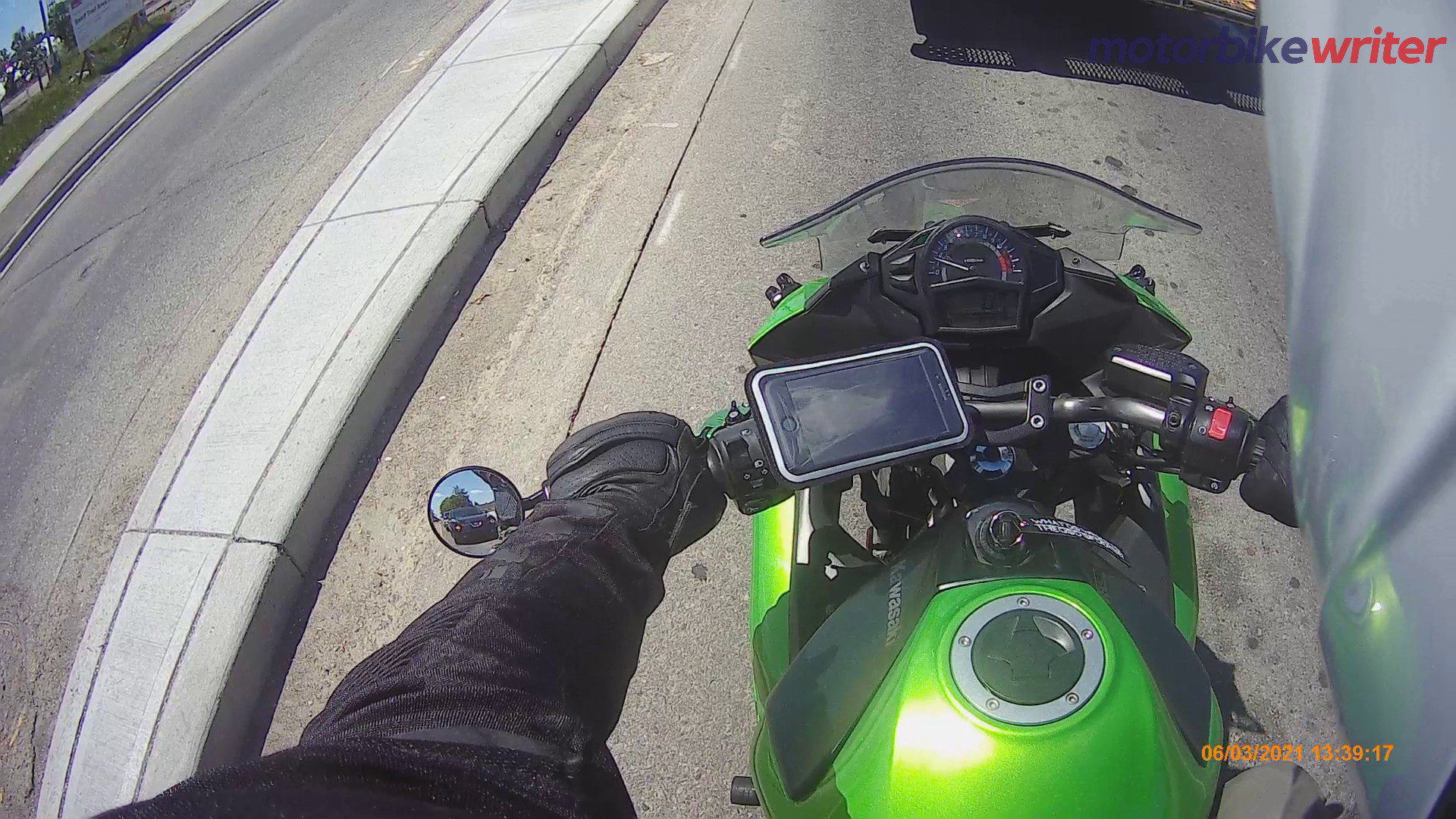

It was so impossible to see the screen, in horizontal or vertical mounting positions, that after another few miles, I pulled over into a parking lot again and took my phone out of the sleeve to memorize the turns I needed. Since the gloves I was wearing at the time, my ICON Super Duty II’s, were not touch-capacitive, I pulled my right one off and found out the second most concerning issue about the sleeve.
Sleeve Does Not Allow For Any Heat Dissipation
The air temperature for that first GPS ride day was about 21 C, or almost dead on 70 F. Yet, when I passed the phone from my gloved hand to my bare hand, I nearly dropped the phone because it was quite hot. As part of the construction of many smartphones these days, the actual body of the phone is used as a heatsink for the powerful processors inside.
The Shapeheart sleeve, however, is designed to keep water, road grit, dust, and such away from your phone while you ride. What it also keeps away is wind. And, as the fold-over flap on the closure is designed to sit tight when a phone is in the sleeve, there is nowhere for any heat generated to realistically escape.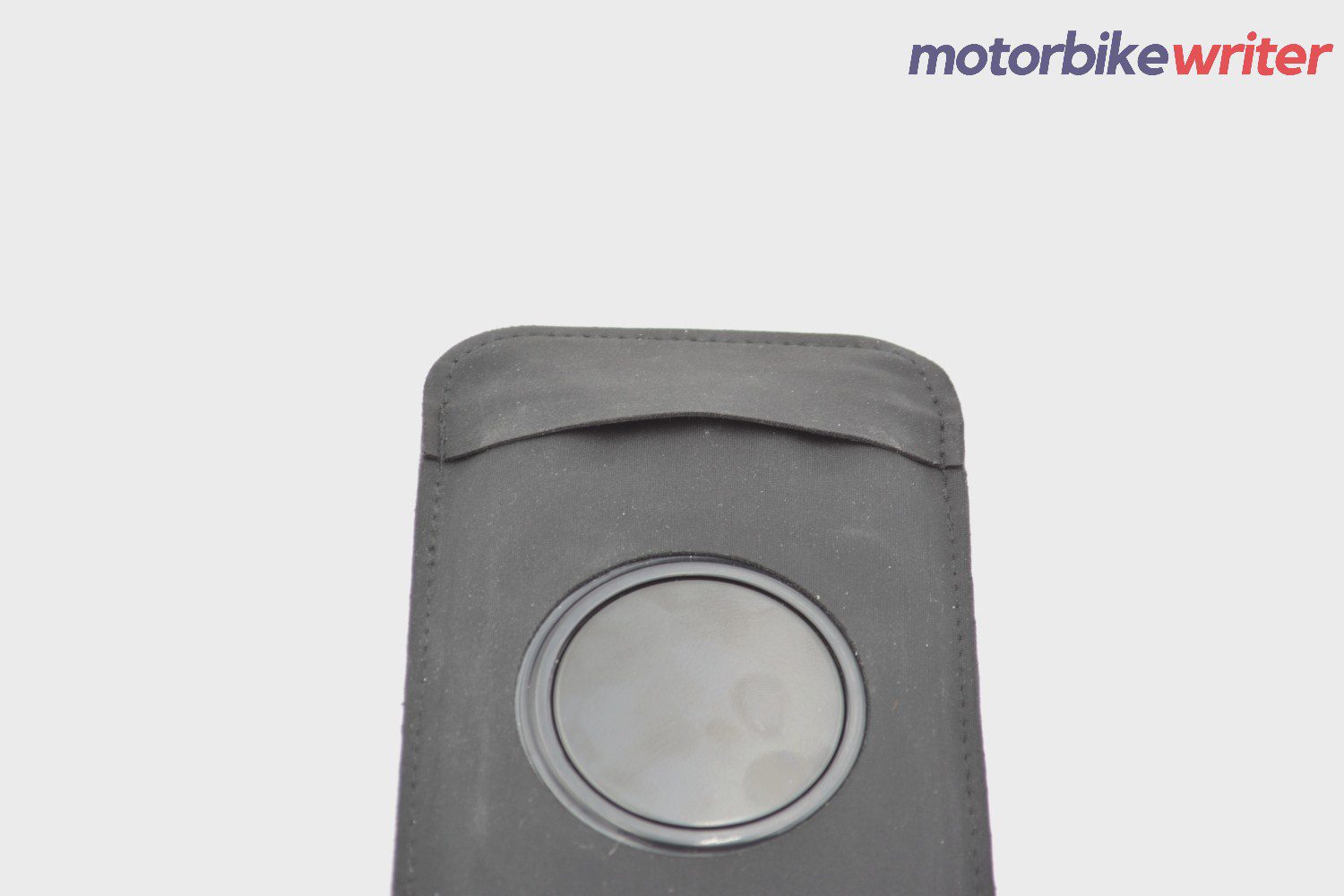
Concerned, I pulled over as soon as I safely could, and, having learned my lesson before, took off my glove and felt the sleeve. It was so hot I jerked my hand away to prevent being burned. The beeping sound, I later found out, was the iPhone’s emergency shutdown that it performs to save itself from damage. I need to reinforce here that the screen was not on, which is more often than not the key heat generator in phone usage.
To compare, my QuadLock mount, which holds the phone over the central handlebar fork connection spar, is completely out of any kind of full-on cooling air, and uses an open face case to hold the phone. Even on the hottest days, I have not experienced any phone overheating, nor has it made it to the point of being burning hot to the touch. In terms of how modern smartphones are built, with every external surface being a heatsink, it is my belief that the open face design of the case allows for the screen surface to radiate enough heat to keep the phone cool.
Another point of interest is that my mount was on the left handlebar, just before the signals and horn box of my clutch hand. On the Ninja 650, this puts it moderately in a windy part of the bike, as the air that comes around the windscreen forms a vortex of air there that air rushes in to fill. In terms of the design of the Shapeheart sleeve, I did not really pay attention to which way the flap was pointing, and I will admit this may have had an effect on cooling.
By using fluid dynamics, a concept in physics about how air or fluids move over, around, or through different shapes and surfaces, it may have been beneficial to heat dissipation to have the case flap towards the outside, or even mount the case vertically with the flap up top. In the first instance, this would have allowed the bulk of air that deflected off the back of the case, following the path of least resistance, to flow towards the flap, and some may have made it into the case, in essence, “inflating” the case a little and giving room for heat convection to take place.
In the second instance, the same principle holds true with the air hitting the back of the case, with some going up, some going down, and most going around the case. This may have allowed for more effective heat dissipation, however, it is only a theory at this point. What may have helped much more would have been to make the case material out of a semi-porous water-resistant membrane, that allows for the case to “breathe,” for air to pass through just enough to hit the back of the phone, and to allow for natural convection to pull heat away from the phone.
Touch-Capacitive Plastic Is Often Not
I protect my iPhone screen with a tempered glass protector. However, for the duration of the month of May 2021, I removed the one that had protected my screen for a couple of years, as I have spares. This was specifically to test out the touch-capacitive clear plastic that is part of the sleeve.
After thoroughly cleaning my phone with a phone-safe screen cleaner and a microfiber cloth, touch was transmitted fairly well through the plastic for the first day or two. Granted, these touches were when I was not on the bike, and the sleeve was not on the mount.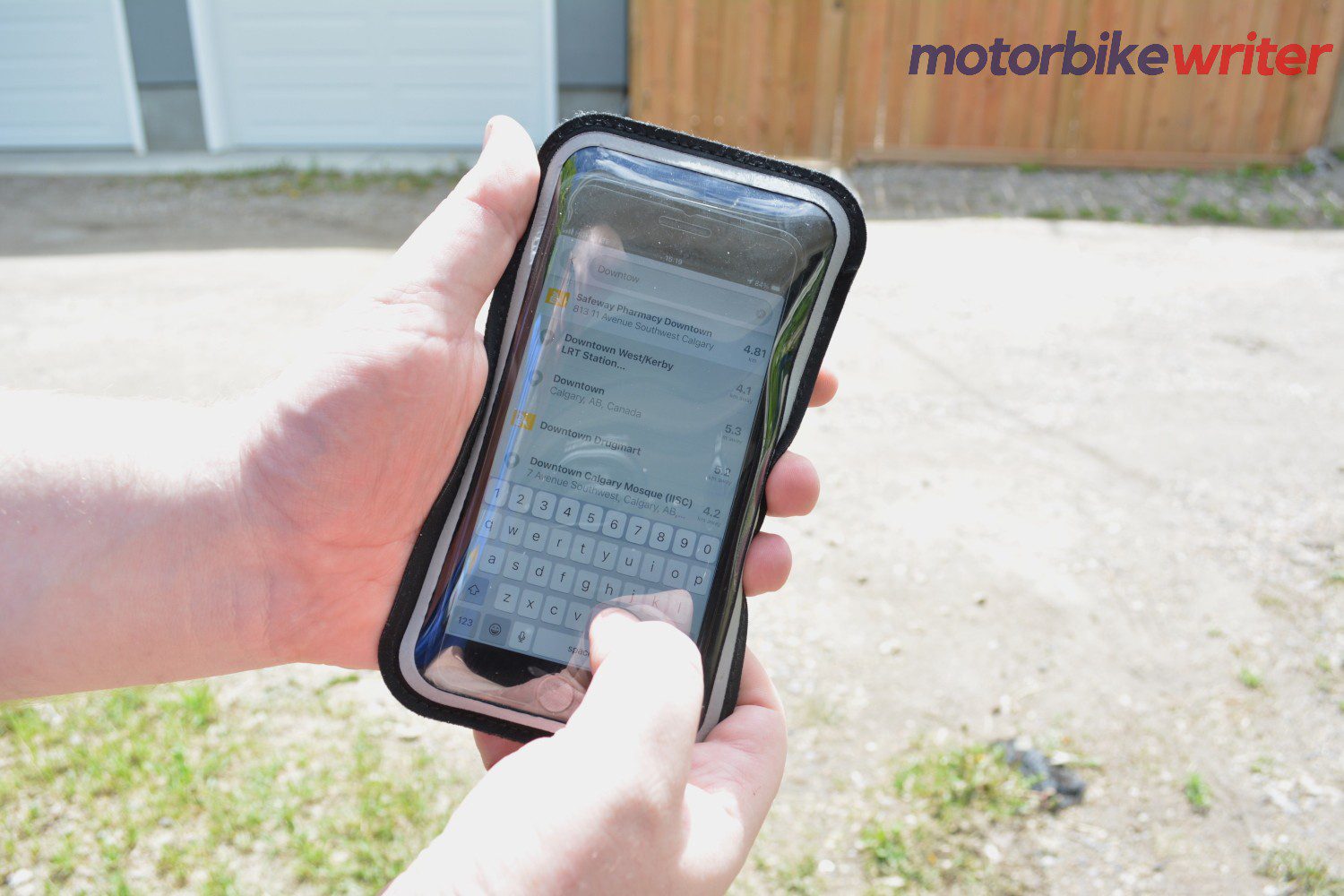
The result, to say the least, was not positive. A light touch would not transmit through at all. A moderate push would transmit, but a moderate push on an iPhone screen these days puts it into widget moving mode, so I would have to light tap the screen again to get it out of that mode… except light taps don’t transmit. Frustrating!
I did find a way to make it work, which was to pinch the sleeve at the base and literally pull it taught to the screen, and even then, only about 2 of every 3 touches transmitted. Thinking it was the sleeve, and as I had the spare with me, I changed out the sleeves. Touch still would not transmit half the time, and often, I would have to use more force than should really be necessary to make the touch transmit.
Sympathetic Vibrations Are Fed Directly To The Phone
One thing that I noted when I was setting up the mount, but accepted, was that the mount had no form of vibration damping. For those that have never ridden a parallel twin sportbike, above 4,000 RPM the bike comes alive with vibration. It’s not an annoying buzzing vibration, at least not to the rider. Yet, due to the nature of a 180 degree cranked parallel twin-engine, vibrations will make their way through the bike.
In 6th gear, my 2012 Ninja 650, to keep a steady cruise speed on the ring road expressway we have here, revs to about 4,500 RPM, give or take a few hundred RPM. This is where I noticed in my peripheral vision that my phone was starting to slip down, in the sense that if I had it pointed mostly up to the sky, after about 5 minutes of cruising, it would be facing directly to my stomach.
In terms of pure physics of what is happening, the handlebars are vibrating at the frequency put off by the engine, but are mounted hard to the forks and therefore one feels more of the road than the engine by a factor of something around 10 to 1. However, this vibration seems to be just at the right frequency to make the silicone mounting strap “slip” slowly.
While that is inconvenient at worst, what this means is that the mount itself is also passing sympathetic vibrations through to the sleeve and to the phone, due to how strongly the magnet holds the sleeve on. Thankfully my iPhone 8 Plus is old enough that it does not have the newest image stabilization accelerometers for the camera, but on newer iPhone 11s and 12s, sympathetic vibrations at the rate of over 3,000 per minute are enough that they could damage those stabilizers, or at the least jar them enough out of alignment that you would have to restart your iPhone.
In comparison, the phone mount I was using before and after the Shapeheart, a QuadLock Handlebar Mount and case, is designed in a way that the arm that holds the locking point absorbs a lot of vibration on its own. As well, I recently purchased the vibration damper for the Quadlock, an accessory that naturally counters sympathetic vibrations, and was using it for a week before the Shapeheart review started.
To see what I am describing, please see the short video below capture from my SENA 10C Pro helmet camera. The mount vibrates a lot when my revs are above 4,000, but as soon as I brake for the change from 70 KPH to 50 KPH without changing gears, the mount all of a sudden smooths out.
Accessory Steel Plate Adheres Only To Metal Or Glass
I have an old, dead Nexus 6P android phone that is my “let’s see what this thing can take” toss-away. Basically, if it fell off while riding, slipped out of my hand and cracked on the floor, et al, it was not the end of the world. For the phone, I have a Poetic Ballistic case, which has smooth plastic ridges on the back.
I took the accessory steel plate, peeled off the 3M sticker cover, and pressed it firmly to the plastic so that it would stay. I picked up the phone, and the steel plate slipped off and landed on my foot. This, in all fairness, made me lift an eyebrow in curiosity.
I felt the edge of the adhesive, and it was tacky and sticky to the skin, meaning that it was properly sticky. With curiosity piqued, I slipped my Nexus 6P out of its case, wiped off the dust and debris with a microfiber cloth, then tried to stick the plate to the aluminum back of the phone. It stuck on the first try, and strongly too for a light press.
I carefully peeled it off, then tried it on the glass back of the iPhone, using only a tiny portion of it on a corner. It stuck to glass the same as it did to aluminum: confidently and strongly. I then tried the plate on the matte plastic of a regular iPhone case. It slipped off again.
Basically, unless your case for your phone is metal or glass, the adhesive used with the plate seems to not like plastics of any kind. This is concerning because if you can’t find a sleeve big enough or the right size for your phone, you’d at least want something like an Otterbox or Ballistic case on your phone in case it did come off during your ride.
This is where I think having a special case, not a sleeve, would benefit the design and idea of the Shapeheart immensely. As I have my QuadLock, it is as simple as a twist on the mount to get it to lock it, and until you press the release lever, it does not come off. With the strength of the magnet on the Shapeheart mount, having a case with a magnetic material inside a small mounting hole would serve the same purpose, and would forgo the sleeve entirely. This could maybe even be cost-effective, as you would get the magnet mount and case instead of the magnet mount and sleeve.
Final Thoughts: Things Work Well, Just Not Well Enough
It may sound like I am taking Shapeheart to task in my review, and I will start my feedback by stating that I am presenting only observed situations and my 100% honest opinion. In fact, I like the idea of a magnetic mounting system, removing the need for using a rotational locking case or using pressure mounts on the corners and sides. It is my personal opinion that Shapeheart really is onto something here, it just needs refinement and evolution.
Having originally come from a wearable fitness armband designed to monitor your heart rate, the sleeves haven’t changed much since the final design that was released in 2017. While strapped tightly around your bicep, the large mounting plate makes sense, to spread contact between the armband magnet and the sleeve plate as wide as possible, due to the jarring changes of direction, or repetitive movements, that happen during exercise.
The size of the magnet of the mount, about an inch in diameter, is perfect for fitting on a bike’s handlebars. Where the refinement and evolution need to come is in following the example of other mount manufacturers and offering an accessory vibration damping mount system, or a case with a thin damper built into a small hole in the back of it that would fit snugly over the mounting magnet.
A Valiant Attempt To Make A Fitness Sleeve Mount Work On A Motorcycle
Seeing that Shapeheart only started business in 2017, they’ve come a long way in four years. They developed a fitness product that introduced a new and comfortable way to track your heartbeat and keep your phone on you while allowing you to whip it off your arm if you needed to send a text, change a music album, and the like.
Where it falls short is that a great fitness mount sleeve, meant to be used during jogging, running, or exercise, does not make a great motorcycle phone mount. The basics of it are solid, and there is real potential for a good, quality product with some iterations on the idea. It does its job as described on the box, but not much more at the moment.
The Shapeheart will work if you absolutely must have a phone mount that is not a pressure fit or corner clamp style on a tight budget. Otherwise, there are far better, albeit more expensive, options out there.
Pros
- Magnet is very strong, and holds the phone sleeve solidly, without any slippage
- Phone sleeves are 99% waterproof
- Phone sleeves are remarkably durable
- If you have a bare phone, or a metal case for your phone, the steel magnet optional plate will serve you well for mounting
- Packaging and product are presented professionally, with clear instructions
Cons
- No vibration dampening at all.
- Phone sleeve clear plastic is hard to see through in sunlight
- The phone sleeve could use a better heat dissipation design
- Touch-capacity phone sleeved only worked about 50% of the time
- Silicon mounting strap has a tendency with high-frequency vibrations to slip
- Steel accessory plate only sticks to metal or glass, not plastic.
Specs
- Manufacturer: Shapeheart
- Price (When Tested): Classic Handlebar Mount Kit €29.95 ($36.50 USD), Spare Shapeheart Sleeve €12.95 ($15.75 USD), Adhesive Steel Plate €9.95 ($12 USD)
- Made In: France
- Alternative models & colors: Mirror stem hard mount for classic British-style bikes, Fork Stem hard mount for supersports and sportbikes
- Sizes: M, XL, XL+ depending on phone model
- Review Date: May of 2021. Published June 11, 2021
- Where To Buy: Shapeheart
Shapeheart Classic Handlebar Phone Mounting System Photo Gallery


